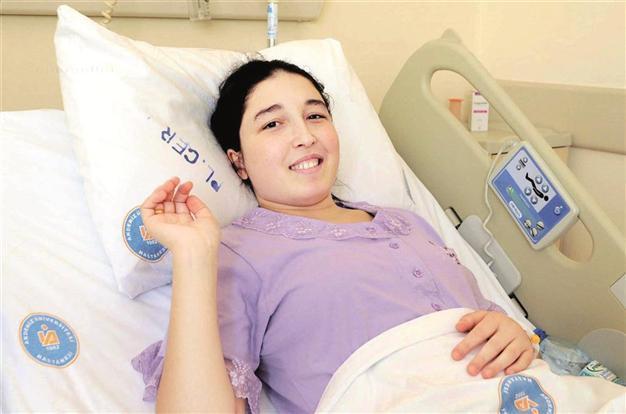First embryo in first uterus
BELGİN AKALTAN - belgin.akaltan@hdn.com.tr

Derya Sert, new uterus, her menstruation cycle and embryo are public information. DHA photo
As if we needed one more… As if we do not have enough Turkish embryos in enough Turkish uteruses that found their way there following simpler routes… As if we needed this medical wonder of transplanting a uterus from a dead woman and planting an embryo there…
My officemate Beril was saying that one should not push nature’s boundaries so much. She thinks that if one is born without a uterus, then instead of risking one’s life with transplants and heavy medication, one should look for other options of having a baby.
I half agree with her. I find this whole uterus transplant, in vitro fertilization, and successful conceiving to be a fascinating advanced medical technology, accessible to all of us. We are lucky to be living in such times, when we are able to make use of this advancement. But at the same time, Beril’s question remains: “Why push it so much?”
You must have heard the story: Derya Sert, from the Mediterranean city of Antalya, was one of the “one in 5,000 women” worldwide born without a uterus. The absence of a uterus does not pose a health risk. But it prevents such women from conceiving a child.
Now, before we go on, let me give examples from my own life. I know only too well what childlessness means, both here in Turkey and elsewhere. And, also, I have experienced the miraculous phenomenon of having a child. I think I can be objective.
I had several health problems, operations and miscarriages and before that, a long period when me and my husband felt we were not ready to have a child. This period all together lasted about 10 years. Then our son was born. He is a university student now. I think I know both sides of the equation. I know the frustration of couples who cannot conceive, women who suffer from family pressure because they cannot get pregnant, those who feel that “the meaning of life” has been taken from them.
I was also frustrated, but my frustration stemmed from not knowing what will happen. Will I have a child or not? How should I plan my life not knowing what will happen? We were just about to start thinking about adoption – which is not common in Turkey and is very difficult – when we conceived.
The taste of childlessnessLet me be frank: Having a child is not the full meaning of life for a woman or a man, or a couple. It is an option. You may or may not have children. It is not a must. It is a life-changing experience, true. It is a life-long commitment, true, but it is also a trap, especially for women. It is extremely rewarding and it is a unique experience. But, again, it is not a must. Your life is not taken away from you if you don’t or cannot have children. There are other options in life just as rewarding, unique and meaningful. (Oh, the AKP, the ruling party, will hate me. They generally think a woman’s only duty in life is to be a mother. And they hate those who think differently, such as Fazıl Say.)
To make it simpler (as if it’s possible), motherhood is no big deal. It may even be a trap, an imposition to keep women at home, to load additional, heavenly meanings to motherhood so women are given secondary roles in social life… Can you tell me what can be so sacred about changing diapers and waking up at 3 o’clock in the morning, to wake up again at 3:20? Oh, God, I am so glad my baby-rearing days are over; God bless those with small children.
Back to Derya Sert, from Antalya: She received the world’s first-ever uterus transplant from a deceased woman on Aug. 8, 2011 at Akdeniz University in Antalya. She is now pregnant with her first child, her doctors announced April 12.
An embryo was transferred to Sert’s uterus and the transfer succeeded, making Sert the first woman ever to be impregnated with a transplanted uterus. Since receiving the uterus, the woman has had normal menstruations. (A question on patient rights: Why should the whole country know about the identity and the menstruation cycles of that poor woman? Isn’t there a more civilized way of publicizing such medical experiments?)
The poor woman, whose borrowed uterus, menstruation and successful embryo plantation are public information, now has to pose to the press with a smile on her face from her hospital bed. The only missing detail is how her husband produced what is needed to make the embryo.
The team of doctors who made the transfer is the same team who conducted the first face transplant of Turkey and the first two-arm, one leg transplant in Turkey. So, yes, the question of whether we are facing a team of over-ambitious doctors is an appropriate one.
The doctors, the patient, the uterus and the embryo will go into world medical literature. The husband will not. In a world of first ladies, first couples, first cats, first dogs, first children, first grandmothers, then why not call this the “first Turkish embryo”? As if we needed one more… Back to Beril’s words; really, why push so hard?
https://twitter.com/belginakaltan
belgin.akaltan.com
